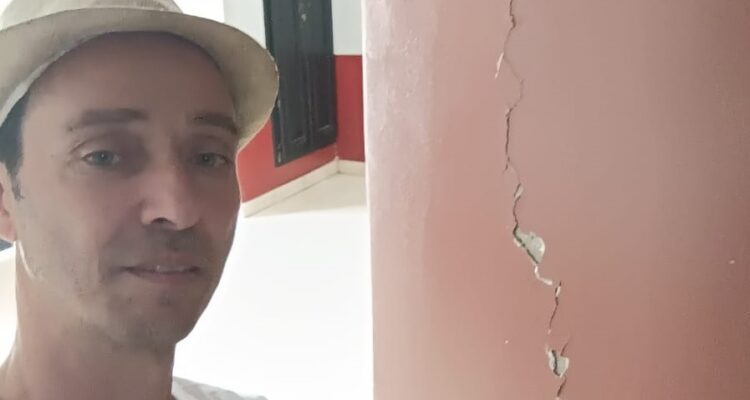Because it was Shabbat when the quake hit, Tsvi Dahan’s family in Israel had no knowledge about his welfare for more than a day.
By Meir Dolev, World Israel News
Tsvi Dahan was looking forward to a long night’s sleep in his comfortable hotel bed in the coastal city Agadir after a grueling week harvesting his etrogs, the strange lemon-like fruit used by Jews on the upcoming holiday of Sukkot.
But it was not to be. As soon as his head hit the pillow a little after 11pm, the bed began to shake. He sat bolt upright and felt the hotel room move. “I realized immediately that it was an earthquake,” he told World Israel News.
In a matter of seconds, Dahan was outside the building – in nothing but his t-shirt and underwear. “I might have been scared, I don’t know. All I could think was, I have to get out of this building.” Slowly, other hotel guests and neighbors began congregating on the street.
The hotel was not letting guests back inside out of concerns there would be an aftershock, but Dahan was given permission to quickly retrieve clothing and some blankets from his room.
Two 18-year-old women from Germany, the only other tourists staying at the hotel, were terrified and violently shaking. Dahan stayed with them for two hours to console them. A group of local women passed by and Dahan, who speaks Moroccan Arabic, was able to pair the young German tourists with the local Arab women who took them under their wing. They wrote down his number in case they needed translation further down the line.
Dahan then went to the synagogue, which is adjacent to the hotel, to sleep in the courtyard. The following day, during Shabbat morning prayers, news started trickling in about the magnitude of the earthquake and the destruction it had wreaked. As of this writing, more than 2,600 people were killed and as many as that were injured – and those numbers are expected to rise in the coming days.
But Agadir, more than 100km (80 miles) from the earthquake’s epicenter in the High Atlas Mountains, escaped relatively unscathed. Dahan’s hotel room suffered a few broken windows and cracks in the walls. Because it was Shabbat, and Dahan does not use the phone or other electronic devices in accordance with Jewish law, his family in Israel had no knowledge about his welfare a full 27 hours after the quake first hit.
A Berber named Bilid al Bouhali, who works year-round for Dahan tending to his etrog orchard, arrived early on Sunday to pick him up from Agadir. On the way to Agadir, Bouhali saw hundreds of cars lining the streets.
Older residents of Agadir have not forgotten a devastating earthquake which razed almost the entire city in 1960. “They were all trying to escape, they were traumatized from the last time around,” Bouhali said.
This time around, many of Bouhali’s own friends in a town called Eit Barhil found themselves homeless – or worse – as their crude mud houses crumbled around them. “The sights we were seeing were harrowing,” he said.
The two men drove the 60 km (40 miles) to the foot mountains in the anti-Atlas range where Dahan’s etrog orchard lies. Dahan admitted that he was nervous about what would face him when he arrived. “I’d seen what the earthquake was capable of doing to buildings and thought, how would my trees, which are relatively small, survive that?”
Thankfully, the trees were intact and so were the fruit on them. Etrogs – especially those from Morocco, where they have grown since the Babylonian exile – are prized because of the nature of the commandment involving it. The Bible in Leviticus instructs the Israelites to take a “beautiful” fruit, making it the only commandment where beauty is a factor. Today, a single etrog that is clean of any blemishes and perfectly symmetrical can fetch upwards of $50. For the past month, Dahan has spent upwards of 12 hours a day sorting and inspecting thousands of etrogs to send to Jewish communities in Israel, New York, Paris and London.
Dahan, who holds a Moroccan passport, was due to travel back home to Israel via Marrakech. During his frequent visits to Morocco, he usually makes a pitstop in Marrakech to visit his uncle, but last month his uncle passed away. Another two uncles live in the city. Until recently, one of them lived in Dahan’s mother’s childhood home in the mellah – Marrakech’s Jewish ghetto. The house, like so many of the old stone structures, did not survive Friday’s earthquake.
Incredibly, however, all of Morocco’s plethora of Jewish holy sites – including ancient synagogues and grave sites of venerated Jewish rabbis and kabbalists – remain undamaged.
Dahan’s flight from Marrakech was cancelled and he was forced to reroute via Casablanca, the Moroccan capital which is home to most of Morocco’s 2,500 Jews and which was not impacted by the earthquake.
After a 12-hour delay at the airport, Dahan finally made it back to Israel on Monday evening. His etrogs were due to follow suit a day later.
“I felt enormous relief after finally making it home to see my family,” he said.
Shortly after his return, Dahan received a call from the two German tourists. They had also made it back safely to Germany. They expressed deep appreciation for his care and concern the night of the earthquake and said that despite everything, they were determined to go back and visit Morocco again.





